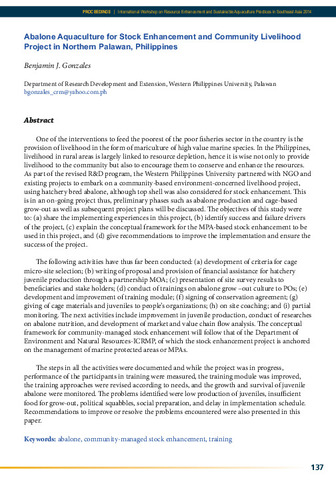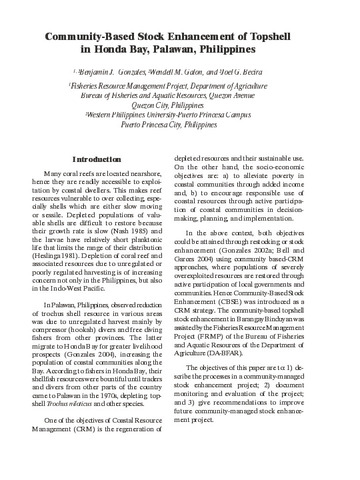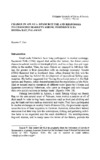| dc.contributor.author | Siar, Susana V. | |
| dc.date.accessioned | 2013-09-26T02:13:28Z | |
| dc.date.available | 2013-09-26T02:13:28Z | |
| dc.date.issued | 2003 | |
| dc.identifier.citation | Siar, S. V. (2003). Knowledge, gender, and resources in small-scale fishing: The case of Honda Bay, Palawan, Philippines. Environmental Management, 31(5), 569-580. | en |
| dc.identifier.issn | 0364-152X | |
| dc.identifier.uri | http://hdl.handle.net/10862/1695 | |
| dc.description.abstract | The coastal zone is a place of intense activity where resources, users, and resource-use practices interact. This case study of small-scale fisheries in Honda Bay, Palawan, Philippines shows that resources, space, and gender are intertwined. The study was conducted between June 1997 and July 1998. The data were gathered using free listing, pile sort, ranking, resource mapping, and key informant interviews. The results showed that women's knowledge about fishery resources and their fishing activities are associated with the intertidal zone whereas men's knowledge is associated with coral reefs. In classifying fishery resources, appearance is the main consideration for women whereas a combination of appearance, habitat, and type of fishing gear is the consideration used by men. Market price is very important because of its dependence on the demand of the export market as well as the local market. Women dominate the buying of fishery products. Many women market their husband's catch, process fish, or gather shells and sea cucumber for sale. Among the fishing households, type of fishing gear provides an indication of socioeconomic standing. This paper concludes that access to resources is shaped by gender and age. The differences in resource knowledge possessed by men and women lead to differential access to fishery resources. In addition, the differences in socioeconomic status also influence resource access. The socialization of children into fishing reinforces the gender division of labor and space in the coastal zone. | en |
| dc.description.sponsorship | This study is part of my doctoral dissertation at the Department of Geography of the University of Hawaii. I am grateful to the East-West Center for the degree fellowship award and the SEAFDEC Aquaculture Department for funding the field research under study code Se-05-CM97T. I thank Brian Murton, Jon Goss, Mary McDonald, Les Sponsel, and Jim Maragos for their insights and comments. I also thank Marilyn Surtida for her comments on the drafts and Ed Ledesma for preparing the maps. | en |
| dc.language.iso | en | en |
| dc.publisher | Springer Verlag | en |
| dc.subject | Holothuroidea | en |
| dc.subject | Philippines, Palawan, Palawan I., Honda Bay | en |
| dc.subject | Natural resource management | en |
| dc.subject | Philippines | en |
| dc.subject.mesh | Adult | en |
| dc.subject.mesh | Anthozoa | en |
| dc.subject.mesh | Commerce | en |
| dc.subject.mesh | Female | en |
| dc.subject.mesh | Humans | en |
| dc.subject.mesh | Male | en |
| dc.subject.mesh | Philippines | en |
| dc.subject.mesh | Sex Factors | en |
| dc.subject.mesh | Conservation of Natural Resources | en |
| dc.subject.mesh | Fisheries | en |
| dc.subject.mesh | Knowledge | en |
| dc.subject.mesh | Social Class | en |
| dc.title | Knowledge, gender, and resources in small-scale fishing: The case of Honda Bay, Palawan, Philippines | en |
| dc.type | Article | en |
| dc.citation.volume | 31 | |
| dc.citation.issue | 5 | |
| dc.citation.spage | 569 | |
| dc.citation.epage | 580 | |
| dc.citation.journalTitle | Environmental Management | en |
| dc.subject.asfa | artisanal fishing | en |
| dc.subject.asfa | coastal zone | en |
| dc.subject.asfa | coral reefs | en |
| dc.subject.asfa | fishery products | en |
| dc.subject.asfa | fishery resources | en |
| dc.subject.asfa | fishing gear | en |
| dc.subject.asfa | labour | en |
| dc.subject.asfa | pricing | en |
| dc.subject.asfa | sex | en |
| dc.subject.asfa | socioeconomic aspects | en |
| dc.subject.asfa | sociology | en |
| dc.subject.asfa | women | en |
| dc.subject.asfa | fishing | en |
| dc.subject.asfa | coastal zone management | en |
| dc.identifier.doi | 10.1007/s00267-002-2872-7 | |



